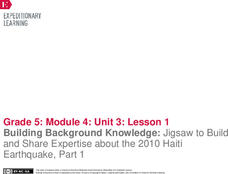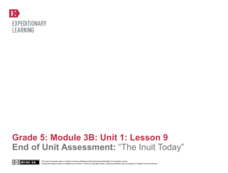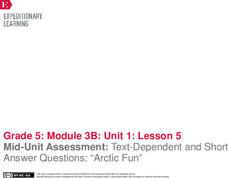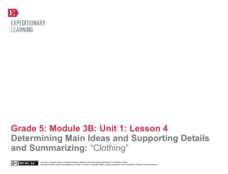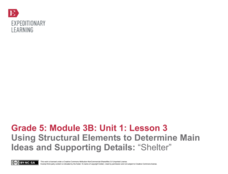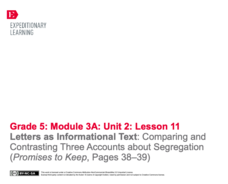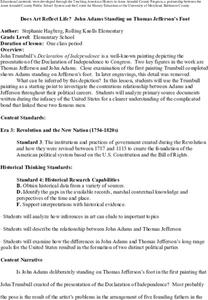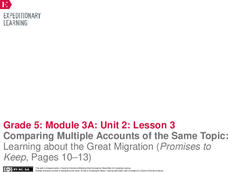EngageNY
Building Background Knowledge: Jigsaw to Build and Share Expertise about the 2010 Haiti Earthquake, Part 1
Using the Jigsaw protocol, scholars study chunks of text from a speech given by former US presidents following a devastating 2010 earthquake in Haiti. As they read the speech in small groups, they build background knowledge and share...
California Department of Education
Who Am I?
Inspire scholars to strive for a career in a field they love. Using a game that looks at likes and dislikes, learners discover their Holland code using a three-interest area survey. With their targeted interests confirmed, pupils...
EngageNY
End of Unit Assessment: “The Inuit Today”
Then and now. Scholars complete an end of unit assessment covering The Inuit Thought of It by comparing past and modern day life for the Inuit. They complete a main idea graphic organizer, analyze key terms, and write a summary paragraph.
EngageNY
Determining Main Ideas and Details to Write a Summary Paragraph: “Food”
Let's eat! Scholars read pages 24-25 of The Inuit Thought of It to discover the foods eaten by the Inuit. They sketch a visual gist of the section in their journals and write a summary paragraph about the text.
EngageNY
Mid-Unit Assessment: Text-Dependent and Short Answer Questions: “Arctic Fun”
Let's have a little fun! Readers take a mid-unit assessment by answering text-dependent and short-answer questions using the text Arctic Fun. They then complete a form to track their progress in the unit thus far.
EngageNY
Determining Main Ideas and Supporting Details and Summarizing: “Clothing”
Surviving winter. Pupils begin reading on page 18 of The Inuit Thought of It: Amazing Arctic Inventions and sketch how the people used animal skin clothing to survive the winter. Readers complete a main idea graphic organizer with...
EngageNY
Using Structural Elements to Determine Main Ideas and Supporting Details: “Shelter”
Does the picture tell the story? Learners continue their work in The Inuit Thought of It by creating a visual gist of pages 16 and 17. They then complete a main idea graphic organizer and discuss key supporting details.
EngageNY
Letters as Informational Text: Comparing and Contrasting Three Accounts about Segregation (Promises to Keep, Pages 38–39)
Letters ... a lost art or good resource? Scholars add letter writing to their informational text chart and describe the features of a letter. They then look at page 38 in Promises to Keep and complete a Perspectives Venn diagram. To...
EngageNY
Developing an Opinion Based on the Textual Evidence: Jackie Robinson’s Legacy (Promises to Keep, Pages 58–63)
Jackie Robinson left a legacy beyond the field. Readers look at pages 58-63 of Promises to Keep and summarize Robinson's legacy. They then form and opinion about the legacy and support it with evidence. Working with partners, class...
EngageNY
Developing an Opinion Based on the Textual Evidence: Jackie Robinson’s Role in the Civil Rights Movement (Promises to Keep, Pages 50–57)
Caption this. Scholars look at pages 50-57 of Promises to Keep and discuss the photographs on the pages. They analyze the captions with the pictures and then discuss vocabulary such as human rights and civil rights.
EngageNY
Identifying Supporting Reasons and Evidence for an Opinion: Exploring Jackie Robinson’s Promise (Promises to Keep, Pages 38–45)
Readers take a look at pages 40-45 in Promises to Keep and identify evidence to support Sharon Robinson's opinion about her father. They divide up the text and complete task cards before writing vocabulary from the story on index cards.
EngageNY
Mid-Unit Assessment: Identifying Author’s Opinion, Reasons, and Supporting Evidence: “Courage on the Field”
What do you think? Scholars complete a mid-unit assessment in which they identify an opinion in Courage on the Field along with evidence that supports it. After the assessment, pupils complete Tracking My Progress, Mid-Unit 2 recording...
EngageNY
Identifying Supporting Reasons and Evidence for an Opinion: Exploring Why Jackie Robinson Was the Right Man to Break the Color Barrier (Promises to Keep, Pages 26–29)
Breaking barriers is not an easy thing to do. Scholars read a section in Promises to Keep and summarize how Jackie Robinson broke the color barrier in baseball. They write the gist of the passage in their journals and then complete a...
Center for History Education
The Star-Spangled Banner: Fact or Fiction?
Is the Star-Spangled Banner an actual account of a gripping battle, or is it just a catchy tune? Young scholars compare eyewitness descriptions of the War of 1812 battle that inspired "The Star-Spangled Banner." They also examine images...
Center for History Education
Why is John Adams Standing on Thomas Jefferson's Foot?
Was it a bromance, or were they frenemies? Young historians use a controversial portrait and letters between Thomas Jefferson, John Adams, and others to evaluate the relationship between the two Founding Fathers. Examining the primary...
Center for History Education
How Did the Public View Women’s Contributions to the Revolutionary War Effort?
Calling upon the legacies of Joan of Arc, Elizabeth I, and Catherine the Great, Esther Reed rallied Southern women to support the American Revolution. Using a broadside by Reed and other primary sources, such as poetry, young historians...
EngageNY
Explaining the Relationships between Events in a Historical Text: Contextualizing the History of Baseball (pages 8–9, 25)
In other words ... it's time to give a summary. Scholars work with a partner to paraphrase a timeline card referring to Promises to Keep. They then work to merge the two timelines to create one timeline. Pupils finish by writing a...
EngageNY
Inferring Author’s Opinions and Writing Opinion Statements: Journalists’ Opinions about Segregation Post–World War II (Promises to Keep, Pages 22–25)
Let's play ball! Scholars summarize information from Promises to Keep about segregation in professional baseball after World War II. They then listen as the teacher reads pages 22-25 aloud. Pupils write the gist in their journals of the...
EngageNY
Comparing Multiple Accounts of the Same Topic: The Story of Bus Desegregation (Promises to Keep, Page 21)
It's all connected. Learners read event details in Promises to Keep to determine the connection between the bus boycott and Jackie Robinson. They watch a video and read Rules for Riding Desegregated Buses to discover even more details to...
EngageNY
Reading to Determine Important Relationships between People and Events: The Importance of the 1936 Olympics for African Americans (Promises to Keep, Pages 16–19)
Scholars look at cause-and-effect relationships while doing a close read of the 1936 Olympics on pages 16-19 of Promises to Keep. They complete a cause-and-effect note catcher and add their ideas to an anchor chart. Readers then work...
EngageNY
Determining Author’s Opinions, Reasons, and Evidence: Signs of Hope and Progress for African Americans in the 1920s (Promises to Keep, Pages 14–15)
Caption this. Readers look at the text features in Promises to Keep and pay special attention to the photographs and captions before adding to the Features of Informational Text anchor chart. Learners then answer questions about life in...
EngageNY
Comparing Multiple Accounts of the Same Topic: Learning about the Great Migration (Promises to Keep, Pages 10–13)
Get the story straight. Scholars gather information about the Great Migration as they listen to a reading from Promises to Keep. They then examine the text to find evidence to support the feeling of resentment. Learners take part in a...
EngageNY
Synthesizing from Informational Texts: Main Idea and Key Details from Promises to Keep (Pages 8– 10)
Learners determine the main idea of a timeline on pages eight and nine of the text Promises to Keep. They use the timeline to complete a Main Idea and Details note catcher and then share their thoughts with the class. To finish,...
EngageNY
Introducing Promises to Keep and Drawing Inferences: Who Is Jackie Robinson and Why Is He Important? (Promises to Keep, Pages 6–7)
Scholars take a picture walk through the book Promises to Keep: How Jackie Robinson Changed America. They make predictions and complete a Notice/Wonder/Inference note catcher. They then define and analyze words on pages six and seven of...


